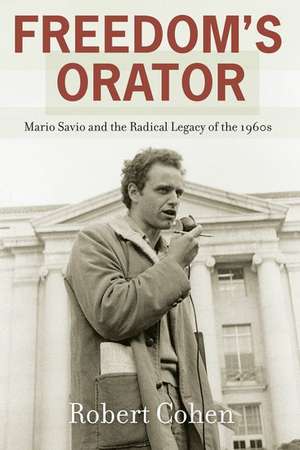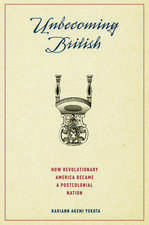Freedom's Orator: Mario Savio and the Radical Legacy of the 1960s
Autor Robert Cohenen Limba Engleză Paperback – 22 mai 2014
Preț: 263.84 lei
Preț vechi: 301.42 lei
-12% Nou
Puncte Express: 396
Preț estimativ în valută:
50.49€ • 52.73$ • 41.86£
50.49€ • 52.73$ • 41.86£
Carte tipărită la comandă
Livrare economică 31 ianuarie-06 februarie 25
Preluare comenzi: 021 569.72.76
Specificații
ISBN-13: 9780199395200
ISBN-10: 0199395209
Pagini: 544
Ilustrații: 10 illus.
Dimensiuni: 152 x 229 x 38 mm
Greutate: 0.76 kg
Editura: Oxford University Press
Colecția OUP USA
Locul publicării:New York, United States
ISBN-10: 0199395209
Pagini: 544
Ilustrații: 10 illus.
Dimensiuni: 152 x 229 x 38 mm
Greutate: 0.76 kg
Editura: Oxford University Press
Colecția OUP USA
Locul publicării:New York, United States
Recenzii
Robby Cohen has written a gripping account of the Berkeley Free Speech Movement that took place in 1964, and the role of the student leader Mario Savio in that movement. Growing up in a working-class Catholic family, Savio struggled with a stammer, but he overcame his stammer to become a passionate and eloquent orator who led the Free Speech Movement in its struggle for political and academic freedom. Cohen tells the story of how Savio became a committed activist as the result of his experiences registering black voters in Mississippi during the Freedom Summer of 1964, and goes on to give a blow-by-blow account of the Free Speech Movement, its struggles and its final success. Here at Berkeley the Free Speech Movement Cafe stands as a memorial to the Movement and Savio's role in it. Cohen's book is both a biography of a remarkable individual and an account of a pivotal moment in Berkeley's history.
What Cohen's account clearly shows is that the FSM was...notable above all for speaking in ways that made political conversation fresh and meaningful, something that correlated with Savio's own non-sectarian leftism.
Robert Cohen tells Savio's story with passion and compassion... It is likely to be the standard reference work about Savio.
Cohen accomplishes the complex task of interweaving Mario's personal story with that of his political engagements, and deftly ties both to the history of the peace and social justice movements that followed. Among Cohen's many strengths as a biographer is his almost uncanny ability to understand Savio's motivations, to see the goodness of his heart, and to honestly consider the psychological demons Savio worked so hard to overcome... Robert Cohen's biography of Mario Savio is earnest, comprehensive, and written as a compelling narrative that does justice to its subject. For this we can all be profoundly grateful.
Mario Savio inspired a generation of young people, and this biography elegantly interweaves the various elements of this complex human being: his gift of speech, the profundity of his thought, his spirituality, his strong aversion to dogma, and above all, his unshakable moral core.
What Cohen's account clearly shows is that the FSM was...notable above all for speaking in ways that made political conversation fresh and meaningful, something that correlated with Savio's own non-sectarian leftism.
Robert Cohen tells Savio's story with passion and compassion... It is likely to be the standard reference work about Savio.
Cohen accomplishes the complex task of interweaving Mario's personal story with that of his political engagements, and deftly ties both to the history of the peace and social justice movements that followed. Among Cohen's many strengths as a biographer is his almost uncanny ability to understand Savio's motivations, to see the goodness of his heart, and to honestly consider the psychological demons Savio worked so hard to overcome... Robert Cohen's biography of Mario Savio is earnest, comprehensive, and written as a compelling narrative that does justice to its subject. For this we can all be profoundly grateful.
Mario Savio inspired a generation of young people, and this biography elegantly interweaves the various elements of this complex human being: his gift of speech, the profundity of his thought, his spirituality, his strong aversion to dogma, and above all, his unshakable moral core.
Notă biografică
Robert Cohen teaches social studies and history at New York University and chairs the department of Teaching and Learning in NYU's Steinhardt School of Education. A Berkeley graduate, he is the author of When the Old Left Was Young and the co-editor of The Free Speech Movement: Reflections on Berkeley in the 1960s . He lives in Greenwich Village.














